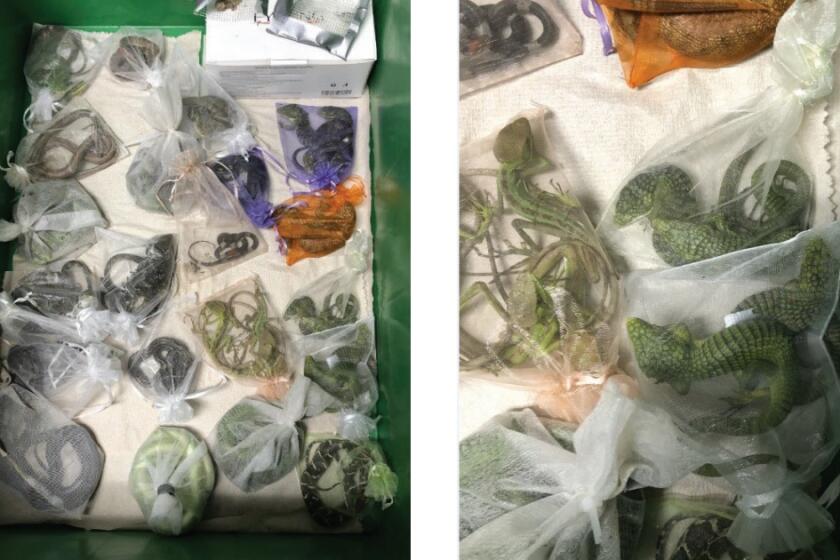Killing and smuggling of rare sheep could land Northern California hunter in prison for 26 years

A Northern California man who attempted to enter San Francisco airport customs with eight full or partial animal corpses in his personal baggage was indicted last week on allegations of conspiring to violate the Endangered Species Act.
Jason Keith Bruce, 49, of Galt, Calif., was also charged with making false statements and smuggling goods into the United States. Similar charges were handed down against Pir Danish Ali, 43, who runs a hunting outfitter and guide company in Pakistan.
U.S. Atty. Phillip A. Talbert announced the charges on March 23 after Bruce was taken into custody that morning.
If convicted on all charges, Bruce and Ali could each face up to 26 years in prison with a fine of $550,000. The most serious of the charges is smuggling, which carries a maximum of 20 years and $250,000.
A gun inside a raw chicken, fentanyl hidden inside candy wrappers, and other top finds by TSA at airports in 2022.
Talbert said in a news release that at least 25 hunters contracted Ali between 2013 and 2018, presenting forged documents to import at least 97 trophies into the United States.
The U.S. attorney’s office said Bruce paid Ali $50,000 to hunt a Ladakh urial, an endangered horned sheep, in Pakistan. The goal was to ultimately smuggle the trophy — either the entire body or a part — into the United States.
Ali informed Bruce, a recreational big game hunter, that a recent survey showed there were only 180 urials in the area where they hunted. Urials are listed as endangered on the U.S. Fish and Wildlife Service’s Environmental Conservation Online System.
Fish and Wildlife Inspector David Yake said urials are protected under the Convention on International Trade in Endangered Species of Wild Fauna and Flora, known as CITES. The treaty was signed by the United States, Pakistan and 184 nations worldwide.
“CITES isn’t an international law, but an understanding among countries that they will use national laws to enforce and protect endangered animals,” Yake said. “In the case of the U.S., even though the urial was killed in Pakistan, we’re allowed to use the Endangered Species Act to prosecute.”
An Oxnard man pleaded guilty to smuggling more than 1,700 animals into the U.S. over a six-year period, some in his pants, according to prosecutors.
Yake said urials “have the highest order of protection” on CITES’ website, meaning a hunter would need permission and permits from both the United States and Pakistan to hunt and export the animal.
Ali and Bruce agreed to rely on bribery and false documents, the U.S. attorney’s office alleges, to import the animal. The plan was to declare the animal to Customs and Border Patrol as another species and use forged or fake documents for backup.
Bruce flew into San Francisco on March 29, 2018, with the eight trophies and was stopped by the customs office, which handed him over to Fish and Wildlife. The agency seized Bruce’s trophies. The U.S. attorney’s office said both men conspired to lie about their catch with Fish and Wildlife Service officials.
Lauren Horwood, spokesperson for the U.S. attorney’s office, said the indictment was the culmination of a five-year investigation conducted by the Fish and Wildlife Service’s Office of Law Enforcement.
More to Read
Sign up for Essential California
The most important California stories and recommendations in your inbox every morning.
You may occasionally receive promotional content from the Los Angeles Times.












